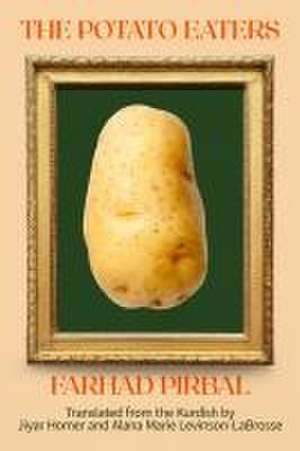The Potato Eaters
Autor Farhad Pirbal Traducere de Alana Marie Levinson-Labrosse, Jiyar Homeren Limba Engleză Paperback – 9 iul 2024
Preț: 90.31 lei
Nou
17.28€ • 18.11$ • 14.29£
Carte disponibilă
Livrare economică 22 martie-05 aprilie
Specificații
ISBN-10: 1646052706
Pagini: 200
Ilustrații: No
Dimensiuni: 127 x 203 x 11 mm
Greutate: 0.22 kg
Editura: Deep Vellum Publishing
Notă biografică
Farhad Pirbal is a Kurdish writer, philosopher, singer, poet, painter and critic. He was born in the city of Erbil in Southern Kurdistan. He studied Kurdish language and literature in the University of Salahadin in Hewlêr. In 1986, he left Kurdistan to France, where he continued his studies in University of Sorbonne in the field of Kurdish literature. After going back to Southern Kurdistan, in 1994, he established the Sharafkhan Badlisi cultural center.
Descriere
From Kurdish poet and writer Farhad Pirbal, a heartbreaking collection of short stories.
Each tale underlines “otherness”, or isolation and displacement in contemporary society. His characters are at once resonant and shocking, his ability to decry trauma reminiscent of American greats like Morrison and Hurston.
The title story from this collection is one of the most acclaimed Kurdish short stories; it features a town that, due to famine, only survives on potatoes. The community comes to appreciate the base cuisine and abandon currency for their coveted starch. When the story’s protagonist returns from his travels, he brings gold home and he is met with utter apathy; he is a stranger in his own country.
“Lamartine” tells the story of a struggling poetry expert with a PhD on Lamartine’s lines in search of a lucrative career. He has trouble finding the right words to get a job. He visits a local career agency and in plain verse, asks for a career; he and the agent imagine a world wherein poets are paid by the line instead of the hour, a world in which artists always have a steady income. After the encounter, he says to a statue of his hero, “we really do live pitifully, us all like us, artists and poets. Often I have thought that a demon, at the beginning of time, must have nursed us: misfortune our first milk.”
“The Deserter” spotlights a forgetful soldier struggling to find his lost leg in 1989. He hobbles for nearly ten days until his Corporal informs him to prepare for war. “How?”, he wonders. The two go in search for a new leg, scavenging through piles of human body parts. In war, all warriors lose pieces of themselves: legs, arms, minds, hearts and souls. He reflects on his station: “My generation and I…are the we are the sacrifice of our era; the sacrifice to war and the dirty battles of those fools and frauds we call today’s leaders.” The story ends there―without resolution. This finality parallels the ramifications of war: stories and lives cut short, questions left unanswered.
